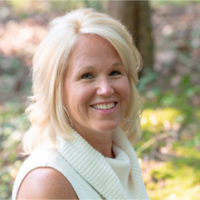I spent many years of my life striving for perfection.
I wanted the perfect house with the pristine yard, perfect car, perfect outfits, and the perfect job.
I exhausted myself with making all things perfect. Everything was neat and orderly—there was a place for everything—and everything was in its place.
My type-A personality fed into the desire for perfection. I struggled for years to rest into greater ease and joy and to drop the need to be perfect in all things. I muscled my way through life, striving for the perfect outcome.
I didn’t have a sense of grace or ease. I thought that was just what I was supposed to do in life, and I was never taught any differently. I also had a false sense of control. It allowed me to believe I had control over all situations in my life.
Until one day, about nine years ago, when my husband and I received devastating news he had been diagnosed with stage four colon cancer. All of my time and attention suddenly shifted and focused on him and his illness. We sought everything possible to restore his health. Sadly, after a year-long battle with cancer, he passed away.
Wow, what an eye-opening realization for me. Perfection and materialistic things really do not matter. Life is about love and connection with people.
I knew this at my core, but it was a clear lesson learned. Perfectionism does not equal happiness.
I also realized I could no longer use my old habitual ways of muscling through life in dealing with the massive level of devastation and loss. I needed to let go of control because it was absolutely a myth. When he passed, I fell into a dark place and struggled immensely.
However, life doesn’t stop. I am a mom, and I had a job and responsibilities—taking care of my children and my house and paying bills—and I needed to show up, even though all I wanted to do was run and hide.
While I was trying to establish my “new normal” in my life, another unimaginable event occurred. Hurricane Sandy ravaged our home at the Jersey Shore. My children and I were rendered homeless. Another abrupt wake-up call that further put things into perspective, creating a new lens and view of my life.
I received a good dose of reality. Knowing I needed support and guidance, I sought counseling. Among many things, my counselor suggested I find an outlet, because I did not have mental clarity, I was not sleeping, I was experiencing racing thoughts, and I was depressed. I felt like I was no good to anyone. I was in a constant state of fight-or-flight, and cortisol was pumping through my veins.
I worked to make space for “me” time. Even though I didn’t think I could, I knew it was necessary.
This is when I was divinely led to the beautiful practice of yoga and meditation. It allowed me to get outside of my head—and into my body. My very first yoga class started a beautiful journey for me, and one I am still following to this day.
Originally, I had begun to practice yoga for the physicality of it, but then something transformed. I began to notice internal shifts—a greater sense of happiness, a calmer mind, connection, and internal peace—all the things I had been searching for.
It is my belief meditation and yoga saved my life. I am a recovering control addict and perfectionist, and I have learned both of those traits do not serve me.
Meditation and yoga both have served as an anchor through dark and uncertain times of grief and loss as well as aided in dealing with my life’s stressors. I have leaned heavily on my practices to guide me through this current difficult worldwide crisis. I am blessed I have tools to reach for to help me navigate life. I refer to them as my personal tool kit.
We all know we have a toolbox in our house, and usually it contains a hammer, screwdriver, duct tape, nails, wrench, pliers, a level, and so on. We use all of these tools around our house to fix or repair what may be broken, or what needs our attention, or our love—to restore it to what it should be. These tools are essential, and you have to keep them handy so you can pull them out at any time.
Well, the same applies to us as human beings.
The idea of having a personal tool kit is a necessity, especially as we navigate times such as the current worldwide pandemic. I have often heard through my various trainings, “Here’s another tool for your tool kit.” I always loved that analogy.
Over the years, I have built up my tool kit to be a full arsenal. It is full of tips, tricks, tactics, and strategies to help me navigate difficult times. These are uncertain times, and if I did not have those tools, I would be filled with stress, fear, and anxiety, and I would be trying to control it. I am so grateful for my tool kit.
What is remarkable is that, just like the toolbox in my house, those tools have done exactly what they are meant to do—fix, repair, reset, renew, and rejuvenate. Most importantly, they shift my mindset.
Our minds and our thoughts are powerful. So, we need our arsenal when we are looking to hit reset. Feel free to adopt any of these tools and use them for yourself to build your own arsenal.
These are some of the practices that exist in my personal tool kit:
1. Meditation Practice
It is said “prayer is talking to God and meditation is listening to God.” My meditation practice is a staple in my daily ritual. I can say it has transformed all areas of my life.
Meditation quiets my mind and stills my body. It is a tool that evokes peace and clarity. The beauty of this practice is it can be done anywhere, anytime.
2. Prayer and Worship
For me, this is prayer with God, who is my higher power. For you, it could be whoever or whatever Divine you worship. Sitting in silence with God and praying and fully surrendering to the Divine power is a healing, powerful experience.
3. Practice of Gratitude
Author Melody Beattie tells us, “Gratitude unlocks the fullness of life. It turns what we have into enough, and more. It turns denial into acceptance, chaos to order, confusion to clarity. It can turn a meal into a feast, a house into a home, a stranger into a friend. Gratitude makes sense of our past, brings peace for today and creates a vision for tomorrow.”
Each of us has the ability to cultivate gratitude for even the smallest or simplest of things in life. Science shows us if we practice gratitude on a daily basis, it not only changes the physical chemistry within us, but it allows us to feel more love, compassion, and joy—all of which could be sprinkled within the world today.
I love to write down three things a day I am personally grateful for. These items could be expressed on paper, said out loud to someone, mentioned at the dinner table, or even expressed prior to going to bed.
4. Positive Affirmations
These are power statements you can draw from on a daily basis. This is your sankalpa, your heart’s deepest desire. You can write them on sticky notes and place them around your house and shift your mindset. You can post them on the refrigerator, your bathroom mirror, your car dashboard, wherever you will regularly view them. This will remind you that you are amazing.
5. “Sangha” or Community
“Sangha” is Sanskrit for community. These are “your people.” This could be your family, loved ones, friends, church group, or fellow yogis.
I refer to these individuals as my “front row.” These are the people whom I can call and talk to if I am feeling stressed, anxious, upset, angry, or hurt, or the people I call to share good and exciting news with.
Connecting with empathetic and understanding people can remind you that you’re not alone in the midst of difficulties. Focus on finding like-minded, trustworthy, and compassionate individuals who validate your feelings and support you at any time.
6. Exercise
Move your body in any way, shape, or form. Being active has been shown to have many health benefits, both physically and mentally, and also helps you live longer.
My choice of exercise is yoga, which is actually meditation in motion. Yoga evokes both outer and inner transformation. Yoga and meditation aid in building self-awareness. The more aware you are, the easier it is to break free of destructive behaviors and emotions. Among many benefits, yoga increases the ability to step away from the drama of your own life and become strong and steady to face difficult times, news, or unsettling events. Yoga assists in making changes in your life for the better.
7. Journaling
Free write in your journal. Get your thoughts out of your head and onto paper. This is a great way to let go of what may be swirling around in your mind.
Write whatever you wish, and there is no need to worry about what you write as no one is critiquing, editing, or reading it. It’s for your eyes only.
I was listening to author Elizabeth Gilbert recently on Insight Timer. She shared an exercise she does to help release her fear. She writes a letter of love to herself when fear is present with the will to transform fear to love. She says write it as if you were a dear friend trying to soothe them and make them feel better. Write until your fear dissipates and only love appears. Love is the opposite of fear.
Life does not come with a map on how to navigate it, and we know we will all experience twists and turns, highs and lows, from everyday challenges to traumatic events with more lasting impact, like the death of a loved one, a life-altering accident, or a serious illness. Each change affects us differently, bringing a unique flood of thoughts, strong emotions, and uncertainty.
Yet we can adapt well to life-changing and stressful situations. It is our decision.
Ultimately, we have the ability to make choices and pivot at any time to live the life we were meant to live. We can dip into our tool kit and access the resources available to help us rise up and shine our light.







Read 4 comments and reply